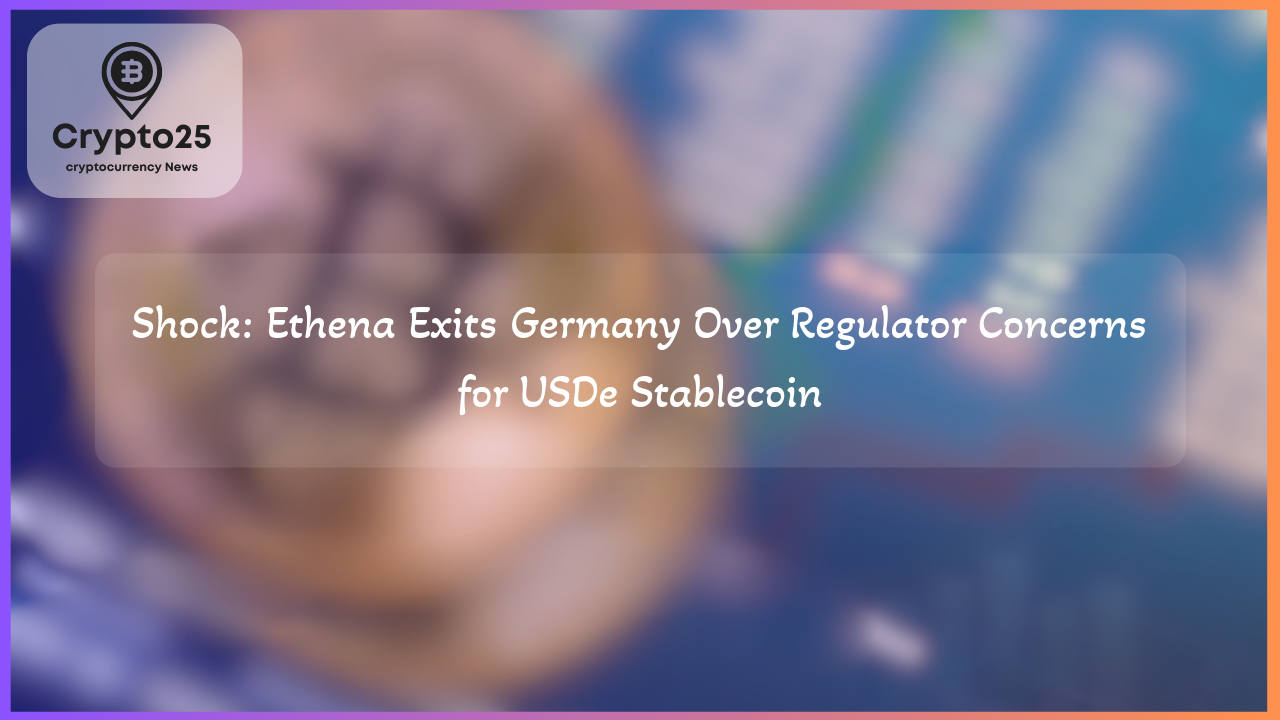
The move by Ethena Labs to cease its German operations highlights the challenges faced by blockchain projects navigating regulatory landscapes. Ethena GmbH, the Frankfurt-based operation of the blockchain layer-1 protocol, is ending its local activities after failing to secure authorization under Germany’s Markets in Crypto-Assets Regulation (MiCAR). This development marks another case of shifting crypto dynamics in response to ever-tightening regulatory scrutiny.
### Ethena GmbH Ends Operations Amid Regulatory Hurdles in Germany
Ethena GmbH, known for issuing the USDe stablecoin—a synthetic U.S. dollar backed by methods like Ethereum staking—has ceased its German operations. The decision followed consultations with Germany’s BaFin, leading to an agreement to wind down the entity’s activities. Despite USDe’s fourth-place position by market capitalization, uncertainties about its classification as a security within Germany pushed Ethena Labs to shift its focus.
From regulated stablecoins to broader crypto offerings, Germany has been a pivotal market for blockchain innovation. However, local authorities demanded that Ethena GmbH suspend minting and redemption activities for USDe on March 21, 2025, citing “serious deficiencies” in legal compliance. This regulatory action also placed restrictions on the firm’s asset reserves, website, and operational management. Such measures indicate a broader clampdown on digital asset platforms by German regulators.
### Ethena Labs Shifts Focus to Global Operations
As Ethena GmbH winds down, its users have been urged to transition to Ethena BVI, an entity based in the British Virgin Islands. This strategic pivot allows the protocol to continue serving its global audience without the regulatory roadblocks encountered in Germany. Ethena GmbH clarified that while direct redemption of USDe is no longer possible under its German operations, secondary market trading of the stablecoin remains unaffected.
This exit emphasizes the complexity of regional regulatory frameworks for crypto projects. While stablecoin offerings like USDe have attracted attention for their unique approach—combining staking yields and synthetic asset issuance—a lack of regulatory harmony between countries continues to challenge industry players.
At the same time, Germany is actively addressing risks linked to digital assets. Recent efforts include shuttering nearly 50 crypto platforms last year to counter illicit financial flows. Despite these challenges, Ethena Labs remains focused on its broader mission of delivering stablecoin solutions via its British Virgin Islands entity, showcasing resilience amid evolving global compliance demands.
### The State of ENA Token and Broader Impacts on Ethena
The market implications of Ethena Labs’ regulatory pivot are evident in its native token, ENA, which has experienced significant price volatility. As of now, ENA is trading at $0.28, reflecting a 6% drop within the past 24 hours and an 81% decline from its all-time high, according to CoinGecko data. For observers in the blockchain and crypto sectors, such downturns underscore the critical interplay between regulatory clarity and investor confidence.
The broader trajectory of Ethena’s synthetic currency strategy remains uncertain. Although the protocol’s promise of combining blockchain innovation with yield-focused solutions appeals to many, navigating regulatory landscapes will ultimately shape its long-term sustainability. Increasingly stringent oversight, particularly in countries like Germany, will likely continue to influence the strategic decisions of crypto firms.
| Title | Details |
|---|---|
| Market Cap | $1.2 Trillion |
Germany’s proactive approach to cryptocurrency regulation, coupled with broader enforcement trends across Europe, sets a rigid precedent for compliance standards. The European Union’s MiCAR framework, which aims to standardize regulations for digital assets within member states, could pave the way for more clarity but has equally created obstacles for firms like Ethena in the interim.
Ethena’s decision to exit Germany is a reflection of the broader challenges the crypto industry faces amid a regulatory crackdown. As firms adapt to these shifts, the resilience of innovative projects such as Ethena Labs’ synthetic dollar solutions will be tested. For global market participants, this serves as a reminder of the importance of regulatory alignment in driving widespread adoption and long-term innovation in blockchain technology.
